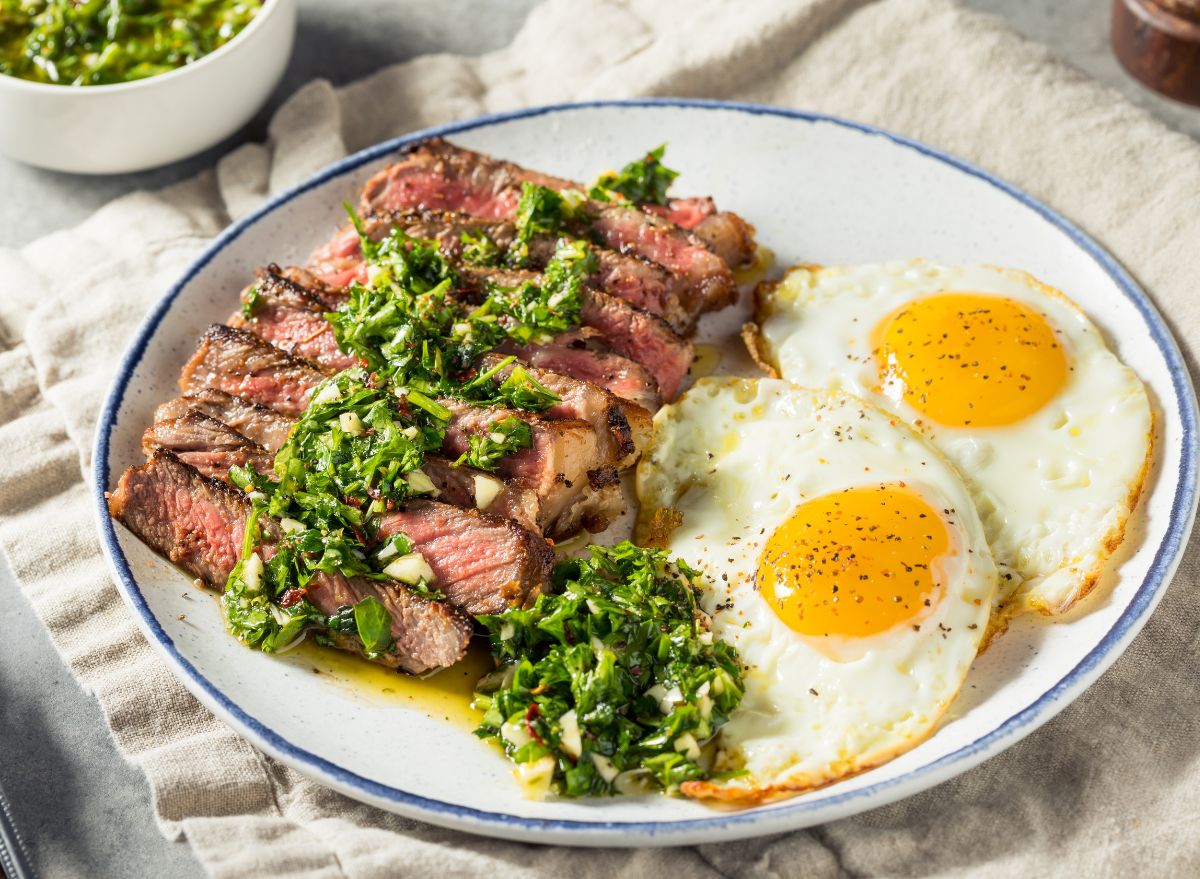Summary of 12 Best High-Protein Breakfast Foods:
*Protein is an important macronutrient that plays a crucial role in our overall health and well-being. Whether you’re looking to build muscle, support weight loss, or simply maintain a healthy diet, ensuring you consume enough protein throughout the day is essential. And one of the best ways to kick-start your daily protein intake is by incorporating high-protein foods into your breakfast.
Having a high-protein breakfast not only keeps you feeling full and satisfied until lunchtime but also helps build muscle and promotes healthy physical recovery from your morning workout. Additionally, research studies have shown that consuming more protein in the morning can reduce late-night snacking and prevent body fat gain.
So, which high-protein foods should you be adding to your breakfast rotation? In this article, we’ll explore 12 of the best high-protein breakfast foods that have received the stamp of approval from dietitians. These foods are not only nutritious and delicious but also easy to incorporate into your morning routine.
1. Chia Seeds
Chia seeds are a versatile and convenient addition to your breakfast. They can be sprinkled on top of yogurt, added to smoothies, or incorporated into overnight oats and cereal. In addition to being a great source of protein, chia seeds are also rich in fiber and omega-3 fatty acids. Research has shown that including chia seeds in your yogurt can increase feelings of fullness and reduce calorie intake throughout the day.
2. Tofu
Tofu is a popular choice for plant-based eaters, but it can also be enjoyed by meat-eaters looking to add more protein to their breakfast. Tofu is a versatile protein source that can be scrambled as a replacement for eggs or incorporated into breakfast stir-fries and tofu breakfast burritos. It is also a good source of calcium, which supports muscle, bone, and nerve health.
3. Steak
While steak may not be your typical breakfast food, it can be a delicious and protein-packed addition to your morning meal. For a high-protein breakfast burrito, cook a lean cut of steak such as sirloin or flank steak, slice it into thin strips, and add it to scrambled eggs along with vegetables like bell peppers and onions. However, be mindful of the levels of total fat and saturated fat in steak and limit your consumption if necessary.
4. Protein Pancakes
Regular pancakes can be high in refined carbohydrates and sugar, leaving you feeling hungry and unsatisfied. Protein pancakes, on the other hand, are a great way to enjoy a sweet treat while boosting your protein intake. You can make protein-rich pancakes using ingredients like protein powder, cottage cheese, or Greek yogurt. Simply mix these ingredients with whole grain flour and your preferred sweetener, and cook them like regular pancakes. You can also try store-bought options like Simple Mills Protein Almond Flour Pancakes for a quick and easy breakfast.
5. Turkey Bacon
If you’re craving a savory side item with your breakfast, turkey bacon can be a satisfying high-protein option. Cured turkey bacon can provide almost 6 grams of protein per serving, while uncured options are still considered high-protein products without added nitrates or nitrites. Turkey bacon can be enjoyed alongside scrambled eggs or used in breakfast sandwiches for an extra protein boost.
6. Eggs
Eggs are a classic choice for high-protein breakfasts. They are inexpensive, easy to cook, and versatile. Each large egg contains around 6 grams of protein, making them a nutritious and filling option. Eggs are also classified as a “complete” protein, meaning they contain all the essential amino acids our bodies need. If you’re concerned about cholesterol, talk to your doctor about your individual needs and consider pairing eggs with high-fiber foods for a balanced meal.
7. Cottage Cheese
Cottage cheese is a protein powerhouse due to its high ratio of casein to whey proteins. It contains approximately 14 grams of protein per half cup and is low in fat and calories. Enjoy cottage cheese on its own or pair it with a bagel, toast, or fresh fruit for a quick and nutritious breakfast option.
8. Greek Yogurt
Greek yogurt is another excellent source of protein, with approximately 20 grams of protein per 7-ounce container. It contains higher levels of casein protein compared to traditional yogurt, making it a popular choice among those looking to increase their protein intake. Greek yogurt can be enjoyed on its own or combined with fruits, nuts, or granola for added texture and flavor.
9. Quinoa
Quinoa is a gluten-free grain that is not only a good source of protein but also packed with fiber and essential nutrients. One cup of cooked quinoa contains around 8 grams of protein, making it a great addition to your breakfast. You can enjoy quinoa as a warm porridge topped with fruits and nuts or use it as a base for breakfast bowls and salads.
10. Nut Butter
Nut butter, such as almond butter or peanut butter, is not only delicious but also a great source of protein and healthy fats. Two tablespoons of almond butter provide around 7 grams of protein. Spread nut butter on whole grain toast or add it to smoothies, oatmeal, or yogurt for a satisfying, high-protein breakfast.
11. Protein Smoothies
Smoothies are a convenient and delicious way to incorporate protein into your breakfast. You can add protein powder, Greek yogurt, or cottage cheese to your smoothies to increase their protein content. Combine your choice of protein source with fruits, vegetables, and a liquid of your choice for a nutritious and portable breakfast option.
12. Protein Bars
Protein bars can be a quick and easy option for those on-the-go mornings when you don’t have time to prepare a full breakfast. Look for bars that are low in added sugars and rich in protein. However, it’s important to read the labels and choose bars that contain quality ingredients and don’t rely heavily on artificial additives.
In conclusion, starting your day with a high-protein breakfast can provide numerous benefits, including increased satiety, enhanced muscle recovery, and support for weight loss goals. Incorporating foods like chia seeds, tofu, steak, protein pancakes, turkey bacon, eggs, cottage cheese, Greek yogurt, quinoa, nut butter, protein smoothies, and protein bars into your morning routine can help you meet your daily protein requirements while enjoying a delicious and nutritious meal.
Remember, it’s always best to consult with a healthcare professional or registered dietitian before making any significant changes to your diet, especially if you have specific dietary restrictions or health conditions.


